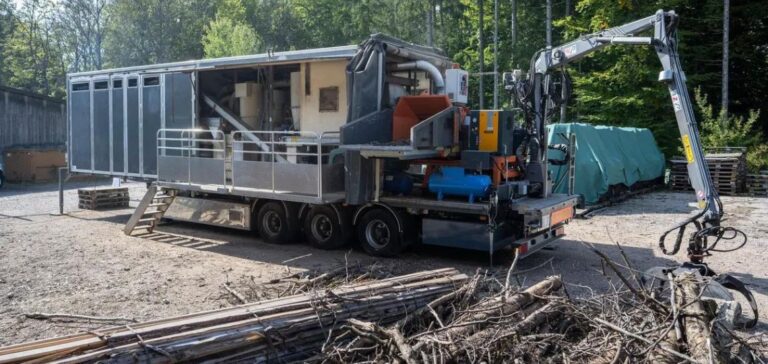Romande Energie continues its expansion in the biomass sector by investing in the Swiss start-up Proxipel.
A mobile pellet factory
Romande Energie announces to invest in a travelling pellet plant designed by Proxipel. The energy company is taking a 4.5% stake in the start-up Proxipel based in Le Vaud, Switzerland. Proxipel develops a pellet factory, able to move on site.
Thus, it transforms green waste into pellets for heating. The concept responds to a strong energy demand and to the expectations of decarbonization in French-speaking Switzerland. Mounted on a semi-trailer, the pellet plant can intervene directly with municipalities or in waste disposal sites.
Moreover, the wood must not be pre-treated. In addition, the pellet plant won the Innovation Award of the Nyon Region. In addition, the biomass plant of the start-up Proxipel is gaining popularity and many countries are interested in it.
A circular economy
Richard Pfister, co-founder and co-owner of Proxipel says:
“We are delighted to be able to count on the expertise and network of a player like Romande Energie to support us in the development of our mobile pellet plant concept. Convinced of the opportunity that wood residues represent to be recycled into pellets and used as a source of heat locally and punctually, we will be able to count on the energy company to accompany us in the evolution of our start-up.”
In addition to meeting a strong demand, Proxipel is part of a circular economy. Indeed, the start-up seduces the forestry operators who will no longer pay to get rid of the forest residues.
Paolo Pizzolato, Head of Capital Venture at Romande Energie, says:
“Romande Energie’s ambition is to make French-speaking Switzerland the first decarbonized region in Switzerland by supporting all its stakeholders. This is why the Group wishes to participate in the development of Proxipel by investing in this start-up. Indeed, as an expert in the field of renewable energies and therefore of biomass, Romande Energie relies on local resources and is delighted with the ingenuity of this concept and its virtuous process to accompany it in the necessary energy transition.”
Romande Energie already owns the Enerbois biomass plant in Rueyres. It produces about 20,000 tons of pellets per year.
Biomass represents a relevant source of renewable energy production in the Swiss energy transition. Indeed, the recovery of wood allows to generate electricity and heat. Then, with the residues of wood, the manufacture of pellets offers an alternative to oil tanks and coal.





















